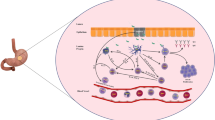Abstract
Polymerase proofreading-associated polyposis (PPAP) is a rare disease with autosomal-dominant inheritance caused by germline variants in the POLE and POLD1 genes. PPAP has been reported to increase the risk of multiple cancers, including colon, duodenal, and endometrial cancers. Herein, we report a case in which multiple duodenal tumors led to the detection of a POLE mutation. A 43-year-old woman underwent esophagogastroduodenoscopy (EGD). Multiple duodenal tumors were detected, and all lesions were treated endoscopically. The patient had a history of multiple colorectal cancers and endometrial cancer along with a family history of cancer; hence, genetic testing was performed, and POLE variant, c.1270C > G (p.Leu424Val) was detected. Hereditary colorectal cancer syndromes should be considered in patients with colorectal cancer who have multiple cancers or a family history of cancer, and multigene panel sequencing is useful in confirming the diagnosis. In addition, duodenal tumors frequently coexist in patients with PPAP-carrying POLE variants, while the endoscopic treatment for duodenal tumors becomes safe and useful with several new approaches. Therefore, surveillance EGD is necessary in such patients for the early detection and treatment of duodenal tumors.



Similar content being viewed by others
Change history
16 March 2024
A Correction to this paper has been published: https://doi.org/10.1007/s12328-024-01951-w
References
Palles C, Cazier JB, Howarth KM, et al. Germline mutations affecting the proofreading domains of POLE and POLD1 predispose to colorectal adenomas and carcinomas. Nat Genet. 2013;45:136–44.
Ito T, Nomizu T, Eguchi H, et al. The first case report of polymerase proofreading-associated polyposis in POLD1 variant, c.1433G>A p. S478N, in Japan. Jpn J Clin Oncol. 2020;50:1080–3.
Yamaguchi K, Shimizu E, Yamaguchi R, et al. Development of an MSI-positive colon tumor with aberrant DNA methylation in a PPAP patient. J Hum Genet. 2019;64:729–40.
Hamzaoui N, Alarcon F, Leulliot N, et al. Genetic, structural, and functional characterization of POLE polymerase proofreading variants allows cancer risk prediction. Genet Med. 2020;22:1533–41.
Palles C, Martin L, Domingo E, et al. The clinical features of polymerase proof-reading associated polyposis (PPAP) and recommendations for patient management. Fam Cancer. 2022;21:197–209.
Magrin L, Fanale D, Brando C, et al. POLE, POLD1, and NTHL1: the last but not the least hereditary cancer-predisposing genes. Oncogene. 2021;40:5893–901.
Siraj AK, Bu R, Arshad M, et al. POLE and POLD1 pathogenic variants in the proofreading domain in papillary thyroid cancer. Endocr Connect. 2020;9:923–32.
Buchbjerg T, Fristrup C, Mortensen MB. The incidence and prognosis of true duodenal carcinomas. Surg Oncol. 2015;24:110–6.
Roos VH, Bastiaansen BA, Kallenberg FGJ, et al. Endoscopic management of duodenal adenomas in patients with familial adenomatous polyposis. Gastrointest Endosc. 2021;93:457–66.
Kato M, Takeuchi Y, Hoteya S, et al. Outcomes of endoscopic resection for superficial duodenal tumors: 10 years’ experience in 18 Japanese high volume centers. Endoscopy. 2022;54:663–70.
Dohi O, Yoshida N, Naito Y, et al. Efficacy and safety of endoscopic submucosal dissection using a scissors-type knife with prophylactic over-the-scope clip closure for superficial non-ampullary duodenal epithelial tumors. Dig Endosc. 2020;32:904–13.
Miura Y, Shinozaki S, Hayashi Y, et al. Duodenal endoscopic submucosal dissection is feasible using the pocket-creation method. Endoscopy. 2017;49:8–14.
Yahagi N, Nishizawa T, Sasaki M, et al. Water pressure method for duodenal endoscopic submucosal dissection. Endoscopy. 2017;49:E227–8.
Bellido F, Pineda M, Aiza G, et al. POLE and POLD1 mutations in 529 kindred with familial colorectal cancer and/or polyposis: review of reported cases and recommendations for genetic testing and surveillance. Genet Med. 2016;18:325–32.
Acknowledgements
We would like to thank all the members of Molecular Gastroenterology, Graduate School of Medicine, Kyoto Prefectural University of Medicine, for their cooperation in obtaining the data for this study.
Funding
No funding was received for this case report.
Author information
Authors and Affiliations
Corresponding author
Ethics declarations
Conflict of interest
The authors have no conflict of interest to declare.
Human and animal rights
All procedure were conducted in accordance with the ethical standards laid down in the 1964 Declaration of Helsinki and its later amendments.
Informed consent
Informed consent was obtained from the patient regarding publication.
Additional information
Publisher's Note
Springer Nature remains neutral with regard to jurisdictional claims in published maps and institutional affiliations.
Rights and permissions
Springer Nature or its licensor (e.g. a society or other partner) holds exclusive rights to this article under a publishing agreement with the author(s) or other rightsholder(s); author self-archiving of the accepted manuscript version of this article is solely governed by the terms of such publishing agreement and applicable law.
About this article
Cite this article
Miyazaki, H., Dohi, O., Maeda, E. et al. Multiple duodenal epithelial tumors in a patient with polymerase proofreading-associated polyposis in POLE variant. Clin J Gastroenterol (2024). https://doi.org/10.1007/s12328-024-01922-1
Received:
Accepted:
Published:
DOI: https://doi.org/10.1007/s12328-024-01922-1




